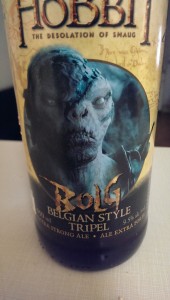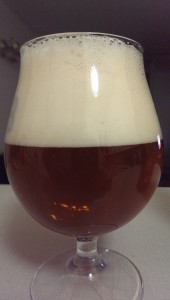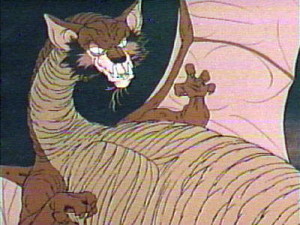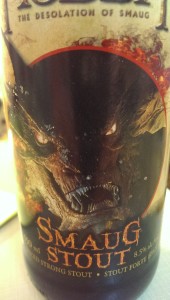In a box in the sky there lived a blogger. Not a nasty, dirty, sexist blogger, concerned with ethics in games journalism, emitting an oozy smell, nor yet a dry, bare, literary blogger with nothing to say but positive things about can-con: he was a beer blogger, and that meant reviewing beverages.
The Background
To celebrate the nearly interminable series of Hobbit films, Warner Brothers has licensed a series of beers to be marketed in Canada and in the United States. In the United States, the beers are brewed by Fish Brewing, while in Canada they are produced by the estimable Central City Brewers + Distillers in Surrey, BC. Central City produces some consistently high quality beer in their Red Racer series and fit happily into that rare category of dependable, affordable beer you actually want to drink.
In some ways, it’s an interesting problem. Clearly Fish Brewing has had these beers out since September and Central City was granted the rights to the property later on. This means that they must be adapting another brewer’s ideas as their own. If the filmic version of The Hobbit has taught us anything at all, it’s that adaptation is a rascally business and fraught with peril. Things people might love in one version don’t end up in the other. Sometimes things get added that people disagree with. Central City without real fault or credit here since they produce consistently high quality beer and are adapting someone else’s ideas.
There’s also an interesting phenomenon at play in terms of selection bias. If you look at the ratebeer ratings for the American versions, they’re consistently higher because they come from all over the country and from people who are into a Hobbit beer in the first place. If you look at the ones from Canada, we’re a hell of a lot harder on Central City. Limited market means more critics, I would guess.
The Arbitrarily Chosen Score Based on Various Criteria
Today we’ll be using the internationally respected Bombadil Protocol as an evaluation tool. Scores reflect the amount the evaluator is annoyed by the character of an item. Naturally, this is an inverse value scale. A 10 on the Bombadil scale might cause one to put down a series of books and never pick them up again. Behaviour that might cause such an action would include singing about yourself.
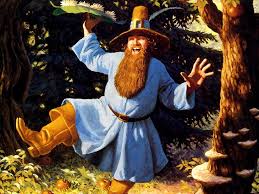
His coat is blue. His boots are yellow. His manner is so infuriating I never finished the damn books.
“Hey dol! merry dol! ring a dong dillo! Ring a dong! hop along! fal lal the willow! Tom Bom, jolly Tom, Tom Bombadillo!” would, for example, rate a 10.
The Beers
BOLG BELGIAN TRIPEL – 7 Bombadils.
Bolg is a truly interesting choice to turn into a beer. In the book, Bolg is killed off by Beorn. Peter Jackson spends several hours building up Azog as the ultimate Badass to challenge Thorin Oakenshield, whilst Bolg is relegated to getting the crap knocked out of him by Orlando Bloom. In the book Azog doesn’t even merit despatch at the hand of Thorin. Dain Ironfoot does for him in what we can only assume is a Glaswegian dockworker’s accent.
The beer is kind of confusing. If you’re given the entire Hobbit mythos to play with to come up with a beer, I’m not sure you’d choose Bolg. Beorn Braggot. Fili & Kili Double IPA. Gandalf’s Hempen Gruit. Thorin’s Dwarven Ale (Oak Shield Aged). Bard Black Arrow Schwarzbier. Knocking Thrush Steinbier. You can probably knock a couple out in the comments.
9.5% seems high for a Belgian Tripel, and at 35 BU Bolg is a little unbalanced. The sweetness really drives the flavour and aroma on this one. There’s the typical clove and bubblegum thing, but an almost lactose-y creamy thing around the edges. On the palate the hops are a little soapy with a wildflower hit and there’s some honeyed malt character. I will say this for it: It’s a good beer. It’s just conceptually dodgy.
GOLLUM’S PRECIOUS PILS – 3 Bombadils
This is a straightforward conceptual leap. What does Gollum want? The Precious. The Precious is made of gold, Pilsner is golden coloured, the lacing leaves a ring around the glass. Actually, I suppose you could have used any kind of golden coloured beer, but given Smeagol’s tragic past and the fact that he was once a common stoor hobbit, a common beer style sort of fits the bill.
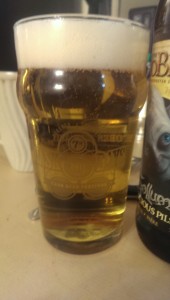
I just realized that I have no idea what Andy Serkis looks like. I could pass him on the street and unless he was wearing a lot of ping pong balls, I’d have no idea.
We likes it. Standard 5.0% Pilsner weight with about 30 BU puts this square in the middle of the style. Aroma is rising dough, light grain toast, peach and white grape. The bitterness on the palate is mostly herbaceous; sort of long grasses flowering. Straightforward finish. Maybe not worth losing a finger over, but I wouldn’t be too quick to throw it into Mount Doom, either.
SMAUG STOUT – 2 Bombadils
Smaug is probably the easiest beer from a conceptual standpoint. It has to be big. It has to be black. It has to burn. Dragons are somewhat limiting in terms of beer creation. I guess you can go the AD&D 2nd Edition route and choose different coloured ones with different breath weapons, but that’s a cheat. Dragons mean fire and fire means smoke and heat. Whether it’s a Tolkien beer or a Game of Thones beer, it’s going to involve chilies.
The Smaug Stout is actually surprisingly balanced. The aroma is not exactly a hurricane, although you can pick out both the peppers and the hop character amongst the sweet malt notes. This uses habaneros, but the shock of its tail is not exactly a thunderbolt. It’s biting, but not like swords. The heat amps up after about half a bottle, so we may consider the “my breath death” quota satisfied.
Actually, between this and the Fire and Blood beer from Ommegang, I’ve got a lot of respect for the restraint being used. Unlike Quest for Glory, you can safely order the Dragon’s Breath. This beer works nicely and is probably the best of the lot.
